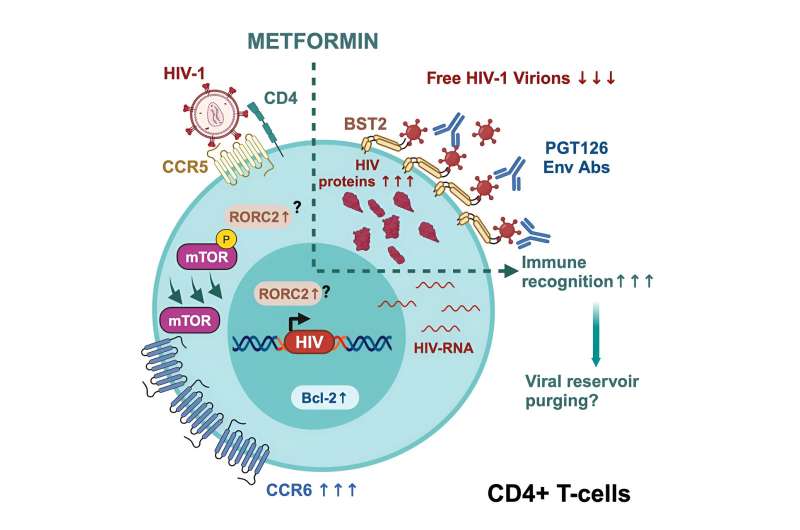This article has been reviewed according to Science X's editorial process and policies. Editors have highlighted the following attributes while ensuring the content's credibility:
fact-checked
peer-reviewed publication
proofread
Diabetes drug helps the immune system recognize reservoirs of HIV, study discovers

Metformin, a drug used to treat type 2 diabetes, could help deplete the viral reservoir and eliminate it entirely in people living with HIV who receive antiretroviral therapy, Canadian researchers say in a new study.
In 2021, a team led by immunologist Petronela Ancuta of Université de Montréal's affiliated hospital research center, the CRCHUM, showed that metformin, when taken for three months, improved patients' immunity and reduced the chronic inflammation usually associated with complications such as cardiovascular disease.
One reason these benefits are so effective is that metformin inhibits the activity of the mTOR (mechanistic target of rapamycin) molecule, which in turn slows down HIV replication in the cells of patients infected with the virus.
In the journal iScience, Ancuta and her student Augustine Fert, the study's first author and a recent Ph.D. holder, go further. They studied the molecular mechanisms of action of metformin on HIV replication in CD4 T lymphocytes, which are immune system cells that provide shelter for the virus.
In these reservoirs, HIV keeps on replicating, which contributes to the chronic inflammation by constantly activating the immune system.
"The results of our in vitro tests on cells from people living with HIV and treated with antiretroviral therapy caught us off guard at first," said Ancuta. "They were a bit surprising. We discovered that metformin had both a proviral and an antiviral effect. The drug helped boost the number of HIV-infected cells, while also stopping the virus from escaping the cell."
Antibodies to the rescue
Another benefit of metformin is that it overexpresses the BST2 protein, which acts as a kind of glue to keep virions clinging to the surface of HIV-infected cells. The immune system then spots them and can target them with antibodies.
"Together with my colleague Andrés Finzi, we tested the ability of several broad-spectrum neutralizing anti-HIV antibodies to recognize viral reservoir cells after metformin exposure in vitro," said Ancuta. "Some of them recognized the virus very well, suggesting their ability to attract and trigger the destruction of infected cells by NK cells through a process of cellular cytotoxicity."
These recent scientific advances mean that the "shock-and-kill" eradication strategy, often used in the fight against HIV, can be foreseen in a different way, she added.
"In people living with HIV and treated with antiretroviral therapy, we could use metformin to reactivate the reservoir cells responsible for viral replication upon treatment interruption, in combination with antibodies that are already used clinically and well tolerated. These antibodies can then detect the rare infected cells and eliminate them."
In the next phase of her research, Ancuta plans to launch a clinical trial to validate her in vitro research results, in collaboration with Finzi and their CRCHUM colleague Nicolas Chomont, and Jean-Pierre Routy of the McGill University Health Center Research Institute.
Before she can move forward with this strategy, she will test it in preclinical models.
More information: Augustine Fert et al, Metformin facilitates viral reservoir reactivation and their recognition by anti-HIV-1 envelope antibodies, iScience (2024). DOI: 10.1016/j.isci.2024.110670





















